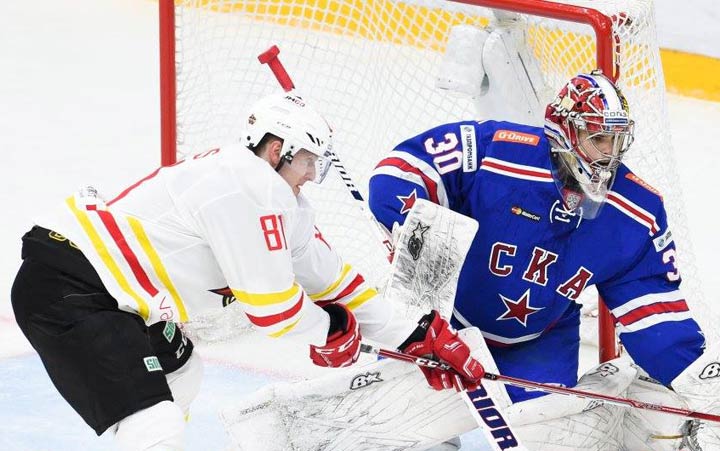Saskatchewan’s Sean Collins, 27, didn’t know what to expect going into it, but he’s now a proud part of hockey history in China.

He grew up playing minor hockey in Saskatoon and has gone on to play professionally in the NHL and AHL. This past summer, Collins signed with HC Kunlun Red Star.
“It’s a pretty cool opportunity how we’re the first pro hockey team in China and that you just don’t know what’s going to happen 10, 20, 50 years down the road,” Collins, who plays centre, said.
READ MORE: Former Saskatoon Blade Ryan Keller retires from professional hockey
One memory he’ll never forget is scoring the first goal in Kunlun’s franchise history during their regular season debut against the Amur Khabarovsk on Sept. 1.
The expansion team in the Russia-based Kontinental Hockey League (KHL) was set up as a vehicle to promote and popularize ice hockey in China.
“It’s been kind of funny … there was the ceremonial puck drop at our first home game and it’s all over the Internet.”
WATCH: Ceremonial puck drop gone wrong in China
“But I think the whole idea with them putting a team in China, you see the population of almost 1.4 billion-plus, if they ever – you have to start at the grassroots level – but if they ever found an interest in hockey, they have the amount of people to become a powerhouse.”
READ MORE: NHL coach Mike Babcock returns to Saskatoon for KidSport and Gordie Howe
The KHL is made up of 29 clubs in Belarus, China, Croatia, Finland, Kazakhstan, Latvia, Russia and Slovakia. One aspect Collins values most about the opportunity is being able to experience the various countries and iconic cities.
“It’s been quite a culture shock to begin with, but I’m starting to get comfortable here and I’ve had the opportunity to obviously travel around quite a bit,” Collins said.
“Being able to visit Moscow, St. Petersburg and Helsinki. It’s been phenomenal in that respect, being able to see these international cities; it’s a lot of history and beautiful architecture that’s probably the best part of it so far.”
In Collins’ opinion, the HC Kunlun Red Star’s inaugural season has kicked off smoothly especially since it was officially given the franchise in late-June and had to play its first preseason game in late-July.
“There have been a few struggles or a few issues but for the most part the organization has done a phenomenal job of always keeping us up-to-date on what’s going on and doing their best to try to push things through,” Collins said.
“China is obviously a Communist country, so there are some loopholes to jump through trying to get visas, bank accounts even something as simplistic as equipment.”
Ironically, Collins said a lot of the equipment is made in China but is exported out of the country and then it’s imported back for the team.
“You’d think it would be so easy to walk over to a factory and be able to get it but I guess there’s no reseller in China and so they have to export it,” he said.
READ MORE: Prince Albert Raiders retire Dave Manson’s No. 4
Although Red Star is a Beijing-based hockey club, the team is temporarily playing in Shanghai due to schedule conflicts. Team members are living in a hotel where their meals and basic amenities are taken care of.
“On the other hand, when you want to go exploring and sightseeing and try new restaurants and kind of get out of the hotel and fend for yourself, it’s quite a challenge,” Collins said.
“There’s a handy app, Google Translate, that’s actually been a pretty good aid for a lot of us so if you can only have questions or you need a grocery store and you looking for a certain item you can kind of pop it in and its translated to Mandarin and you show it to one of the employees,” Collins explained.
“There might be some charades involved, a lot of hand signals, but eventually you get what you need.”
Red Star also features three Chinese players, fluent in Mandarin and English, who have been a great resource for a team that sports a multitude of culture.
“We’re almost a United Nation team. We speak eight different languages. So there’s obviously Mandarin, Finnish, Swedish, Russian, English, French, Slovakian, Slovak … ,” Collins said.
READ MORE: Saskatoon pays tribute to Gordie Howe with ‘Thank You Mr. Hockey Day’
When it comes to strategy on the bench, communication is key, but Red Star faces a language barrier. The head coach, Vladimir Yurzinov Jr., speaks Finnish and Russian and to get his message across, the team utilizes its translators which includes teammate and former NHLer Alexei Ponikarovsky.
“Ponikarovsky’s been great about not only helping the Russian players that don’t speak very good English, but also translating what the coach is saying,” Collins said.
“Sometimes you don’t know exactly what the coach’s message is, but for the most part guys have been really good and the coaching staff that do speak multiple languages have been really good about keeping everybody on the same page.”
Collins hopes to continue making sports history with Red Star in their quest to raise the KHL championship trophy, known as the Gagarin Cup, at the end of the 2016-17 season.








Comments